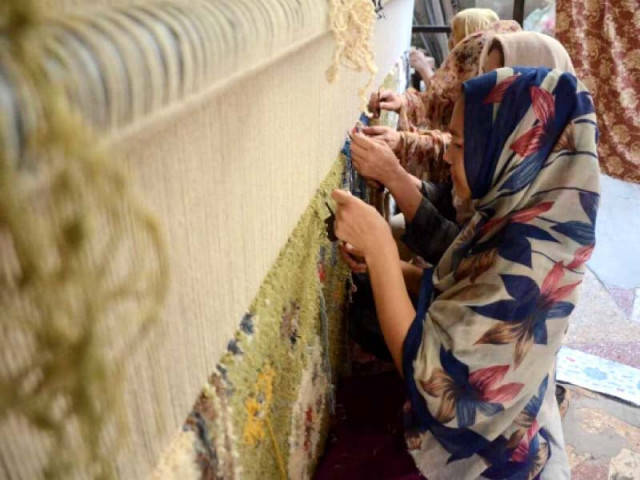Tribeswomen learn carpet weaving in newly merged districts
'Idea is to organize women in groups and empower them with financial literacy, business skills and social capital'

Sunlight entering the murky, sky blue-walled room through the glass window served as a profound metaphor for Asma, a 23-year-old woman belonging to a remote village in Jamrud, district Khyber. Sitting beside that window, she turned her gloom into hope on a hand loom as she wove a rug, tying one knot after the other.
Asma is one of the 240 women from the Merged Areas (MA) who are participating in the flagship Special Emphasis Programme (SEP) on women entrepreneurship, being implemented by Khyber-Pakhtunkhwa (K-P) Department of Zakat, Ushr, Social Welfare, Special Education and Women Empowerment (SWKPK) with technical assistance provided by Merged Areas Governance Project (MAGP) of the United Nations Development Programme (UNDP) and supported by United States Agency for International Aid (USAID). Launched in districts Khyber, Kurram, Bajaur and Mohmand, the goal of this initiative is to financially empower women in the MA via the concept of ‘masharani’ – female leaders.
“The idea is to organize women in groups and empower them with financial literacy, business skills and social capital so they can establish a sustainable enterprise in their homes,” said Dr Samina Afridi, MAGP’s gender specialist who is coordinating on implementing the programme.
Under the initiative, 120 women between the ages of 18 and 40 are being provided training in carpet weaving in Khyber and Kurram districts, and 120 women are being trained in food processing in Bajaur and Mohmand districts.
“The women that are being trained right now will return to their neighbourhoods and impart this knowledge to other women, and start a small production unit of their own,” she explained, thereby becoming business leaders in their areas.
“Keeping the cultural barriers and women’s mobility issues in mind, we have ensured that those who are participating in this programme live near the facilitation centres where the training is being given. Women can walk in groups and reach the facilitation centre within 10 to 20 minutes,” Dr Samina explained, adding that many of them also bring their children to the trainings.
“We also wanted to ensure the group was diverse in terms of skills and experience. For example, if one of them did not know how to read and write, another masharani would help her out,” Dr Samina added, saying that majority women in the group had already been running home-based businesses but they hardly ever made any profit.
She further explained that the first part of these trainings focused on enhancing the women’s capacity to set up groups, manage activities and mobilize resources.
The second phase that is currently in implementation includes women receiving skills training. A workshop was also held in Islamabad to connect the field mobilizers, trainees and people from the business community to develop market linkages.
Published in The Express Tribune, April 15th, 2022.



















COMMENTS
Comments are moderated and generally will be posted if they are on-topic and not abusive.
For more information, please see our Comments FAQ